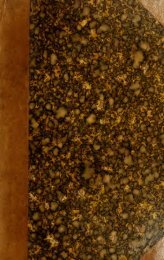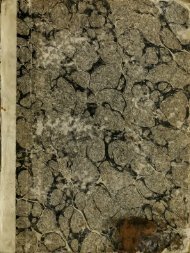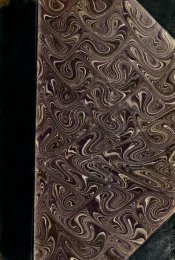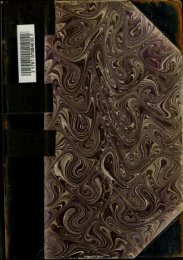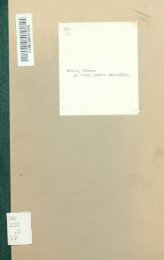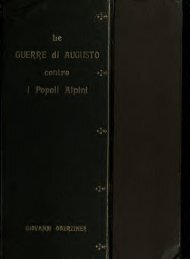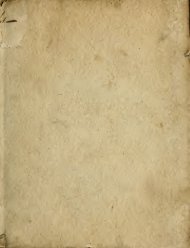Figurative uses of animal names in Latin and their ... - mura di tutti
Figurative uses of animal names in Latin and their ... - mura di tutti
Figurative uses of animal names in Latin and their ... - mura di tutti
Create successful ePaper yourself
Turn your PDF publications into a flip-book with our unique Google optimized e-Paper software.
27<br />
obrutis eius oculis, <strong>in</strong>festantia magnitud<strong>in</strong>em vada praena-<br />
tans demonstrat, oculorumque vice fungitur.^^*<br />
Although it is not essential for a belief to be well-founded<br />
<strong>in</strong> order to ga<strong>in</strong> sufficient currency to effect a transfer, the<br />
metaphor <strong>of</strong> Vegetius appears too <strong>in</strong>volved to appeal to<br />
the popular consciousness. It is hardly probable that the<br />
sol<strong>di</strong>ers stra<strong>in</strong>ed <strong>their</strong> imag<strong>in</strong>ation to such an extent when<br />
easy <strong>and</strong> obvious comparisons presented themselves at every<br />
turn.<br />
In order to ga<strong>in</strong> currency, a transfer must appeal to the<br />
rank <strong>and</strong> file <strong>of</strong> the sol<strong>di</strong>ery. This means that the story<br />
would have to be generally known to the troops, <strong>and</strong>, <strong>in</strong><br />
ad<strong>di</strong>tion, that the prelim<strong>in</strong>ary manoeuvr<strong>in</strong>g <strong>of</strong> the musculi<br />
must be a regular part <strong>of</strong> siege tactics, a th<strong>in</strong>g which<br />
is not emphasized by military writers.<br />
Isidore's fanciful derivation from murusculus (musculus<br />
cuniculo similis fit, quo murus perfo<strong>di</strong>tur, ex quo appellatur,<br />
quasi murusculus) ,^^^ is another <strong>in</strong><strong>di</strong>cation <strong>of</strong> the density <strong>of</strong><br />
the mist that beclouded the real etymology.<br />
Oman states^^" that the bore <strong>and</strong> its shelter are sometimes<br />
referred to <strong>in</strong> the chronicles under the one term " musculus,<br />
' the mouse,' because its object was to gnaw a round hole <strong>in</strong><br />
the lower courses <strong>of</strong> the rampart."<br />
In classic times, the musculus was always clearly <strong>di</strong>fferen-<br />
tiated from the terebra, <strong>and</strong> its employment to protect the<br />
operation <strong>of</strong> the latter mach<strong>in</strong>e was but one <strong>of</strong> several ap-<br />
plications.<br />
If the figure were that <strong>of</strong> gnaw<strong>in</strong>g, we should expect the<br />
term musculus to be applied first to the bore or pick, <strong>and</strong><br />
then by synecdoche to the mantlets, whereas the converse<br />
appears to have been the case, e. g. cupiunt murum succidere<br />
musclis.-^^^<br />
"'Pl<strong>in</strong>. Nat. ix, 62, 88, (186). Cf. also id. xi, 37, 62, (165), Musculus<br />
mar<strong>in</strong>us, qui balaenam antece<strong>di</strong>t. The English has a close analogy <strong>in</strong> the<br />
pilot-fish, "so named because it is <strong>of</strong>ten seen <strong>in</strong> company with a shark,<br />
swimm<strong>in</strong>g near a ship, on account <strong>of</strong> which sailors imag<strong>in</strong>e that it acts as<br />
a pilot to the shark." Webster.<br />
"°Isid. Orig. xviii, 11, 4-<br />
"° Oman, A History <strong>of</strong> the Art <strong>of</strong> War, p. 133.<br />
^ Abbo, De Bellis Parisiacae Urbis, i, 99 <strong>in</strong> Scriptores Rerum Germani-<br />
carum.


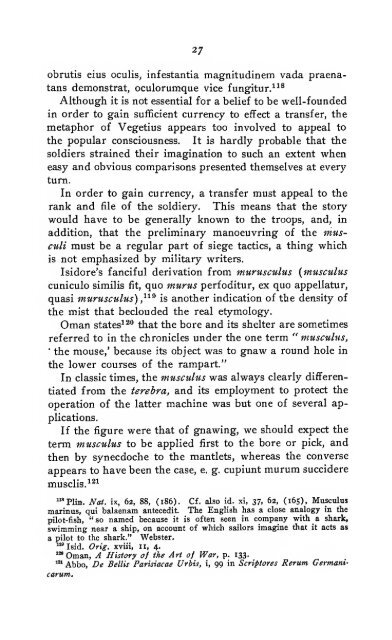
![Das Kriegswesen der Alten [microform] - mura di tutti](https://img.yumpu.com/21606999/1/167x260/das-kriegswesen-der-alten-microform-mura-di-tutti.jpg?quality=85)
